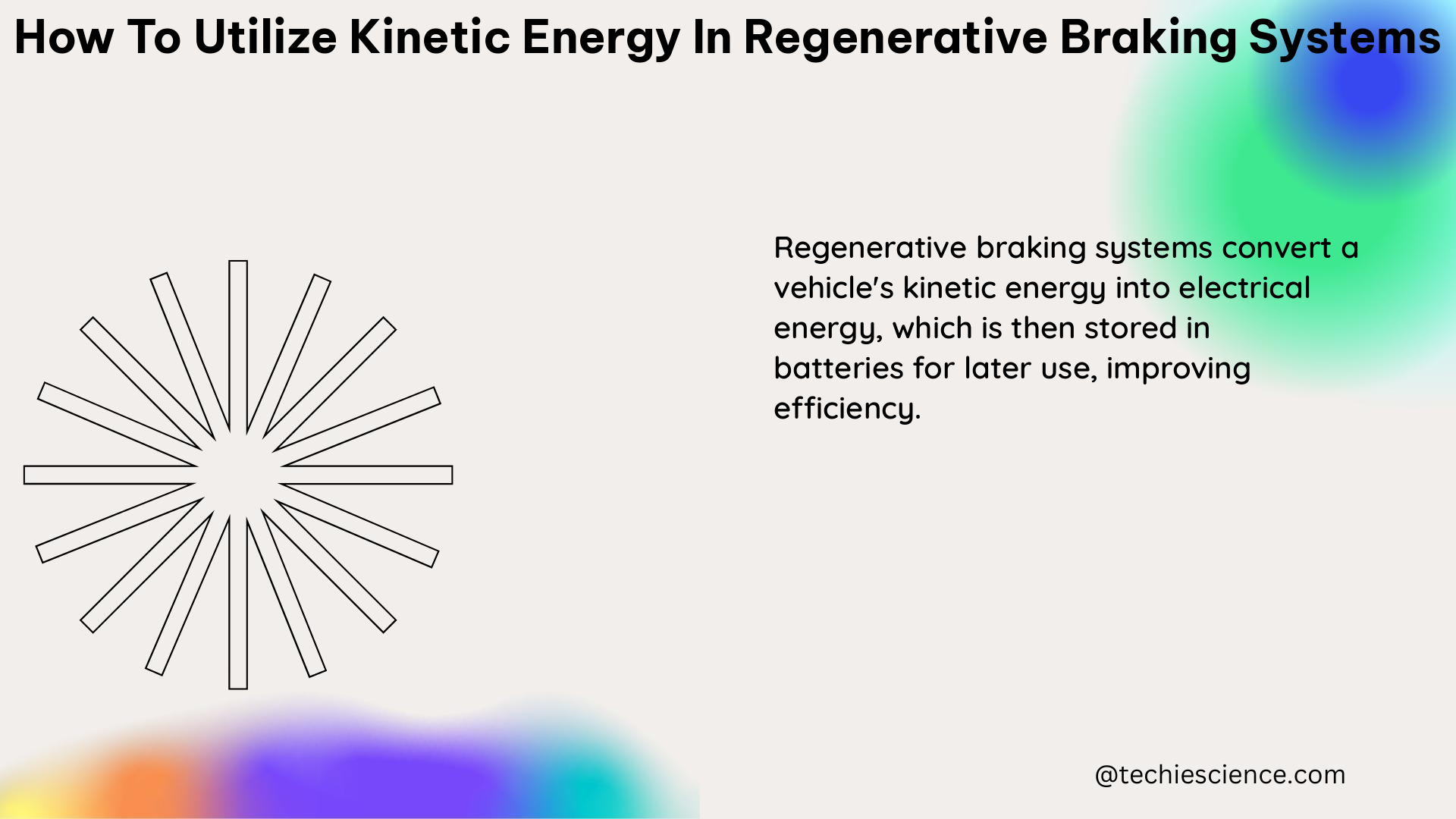Regenerative braking systems offer a highly efficient way to convert the kinetic energy of a moving vehicle into electrical energy, which can then be stored in the vehicle’s battery, extending its range. This comprehensive guide delves into the underlying physics, key factors influencing the efficiency, and practical applications of utilizing kinetic energy in regenerative braking systems.
Understanding the Principles of Regenerative Braking
The fundamental principle behind regenerative braking is the conservation of energy. When a vehicle is in motion, it possesses kinetic energy, which is given by the formula:
Kinetic Energy (K.E.) = 1/2 * m * v^2
Where:
– m is the mass of the vehicle (in kg)
– v is the velocity of the vehicle (in m/s)
During the braking process, this kinetic energy is typically dissipated as heat through the friction between the brake pads and the brake discs or drums. However, in a regenerative braking system, the electric motor is used as a generator, converting the kinetic energy into electrical energy, which is then stored in the vehicle’s battery.
The electrical energy generated during the regenerative braking process can be calculated as:
Electrical Energy = Current * Voltage * Time
Where:
– Current is the current generated (in Amperes)
– Voltage is the voltage generated (in Volts)
– Time is the duration of the braking process (in seconds)
Factors Influencing Regenerative Braking Efficiency

The efficiency of a regenerative braking system can be influenced by several factors, as highlighted in various research studies:
- Vehicle Journey Characteristics:
- According to a study by Zhang et al., the segment characteristics of the vehicle’s journey, such as strong braking deceleration and large deceleration, are strongly correlated with the vehicle’s brake regenerative energy.
-
For example, a vehicle undergoing frequent and intense braking events will generate more kinetic energy that can be converted into electrical energy, leading to higher regenerative braking efficiency.
-
Ambient Temperature:
- The ambient temperature can affect the process of the regenerative braking energy feedback, as shown in the study by Zhang et al.
-
In a low-temperature environment, the total braking energy, battery charging power and loss, and the braking energy distribution ratio can change, resulting in less brake regenerative energy.
-
Vehicle Speed and Road Gradient:
- As reported in the study by Al-Zubaidi and Al-Hadhrami, the vehicle’s speed and the road gradient (uphill or downhill) can affect the regenerative braking efficiency.
-
Higher vehicle speeds and steeper downhill gradients generally lead to increased regenerative braking efficiency, as the vehicle has more kinetic energy to convert.
-
Driving Style:
- The driving style, such as the aggressiveness of braking, can also influence the regenerative braking efficiency, as discussed in the study by Al-Zubaidi and Al-Hadhrami.
- Smooth and gradual braking tends to result in higher regenerative braking efficiency compared to sudden and aggressive braking.
Practical Applications and Numerical Examples
To illustrate the practical application of regenerative braking systems, let’s consider a numerical example:
Suppose a 1500 kg electric vehicle is traveling at 60 km/h (16.67 m/s). During a regenerative braking event, the vehicle generates a current of 50 A and a voltage of 200 V for 5 seconds.
-
Calculating the Kinetic Energy:
Kinetic Energy (K.E.) = 1/2 * m * v^2
K.E. = 1/2 * 1500 * (16.67)^2 = 208,657.5 J -
Calculating the Electrical Energy Generated:
Electrical Energy = Current * Voltage * Time
Electrical Energy = 50 A * 200 V * 5 s = 50,000 J
This example demonstrates how the kinetic energy of the vehicle is converted into electrical energy during the regenerative braking process, with the electrical energy being stored in the vehicle’s battery.
Experimental Validation and Research Insights
To further validate the performance and efficiency of regenerative braking systems, researchers have conducted various experimental tests in real-world driving conditions and different road geographies.
For instance, the study by Al-Zubaidi and Al-Hadhrami analyzed the regenerative braking efficiency in an electric vehicle through experimental tests. They found that factors such as vehicle speed, road gradient, and driving style significantly impact the regenerative braking efficiency.
Additionally, the research paper by Zhang et al. titled “Research on the influence factors of brake regenerative energy of pure electric vehicles based on the CLTC” provides valuable insights into the correlation between the vehicle’s journey characteristics and its brake regenerative energy.
Conclusion
Regenerative braking systems offer a highly efficient way to harness the kinetic energy of a moving vehicle and convert it into electrical energy, which can be stored in the vehicle’s battery. By understanding the underlying principles, key influencing factors, and practical applications, engineers and researchers can optimize the design and performance of these systems, ultimately leading to improved range and energy efficiency for electric vehicles.
Reference:
- Zhang Haiyan, Chen Dawei, Zhang Hao, Liu Yu, “Research on the influence factors of brake regenerative energy of pure electric vehicles based on the CLTC,” ScienceDirect, 2022.
- “Putting on the brakes: Regenerative braking in accident reconstruction,” PropertyCasualty360, 2020.
- “The Fundamentals of Regenerative Braking,” NRS Brakes, 2021.
- “Quantifying the Deceleration of Various Electric Vehicles Utilizing Regenerative Braking,” SAE International, 2023.
- A.M. Al-Zubaidi, M.A. Al-Hadhrami, “Analysis of regenerative braking efficiency in an electric vehicle through experimental tests,” ResearchGate, 2022.

The lambdageeks.com Core SME Team is a group of experienced subject matter experts from diverse scientific and technical fields including Physics, Chemistry, Technology,Electronics & Electrical Engineering, Automotive, Mechanical Engineering. Our team collaborates to create high-quality, well-researched articles on a wide range of science and technology topics for the lambdageeks.com website.
All Our Senior SME are having more than 7 Years of experience in the respective fields . They are either Working Industry Professionals or assocaited With different Universities. Refer Our Authors Page to get to know About our Core SMEs.